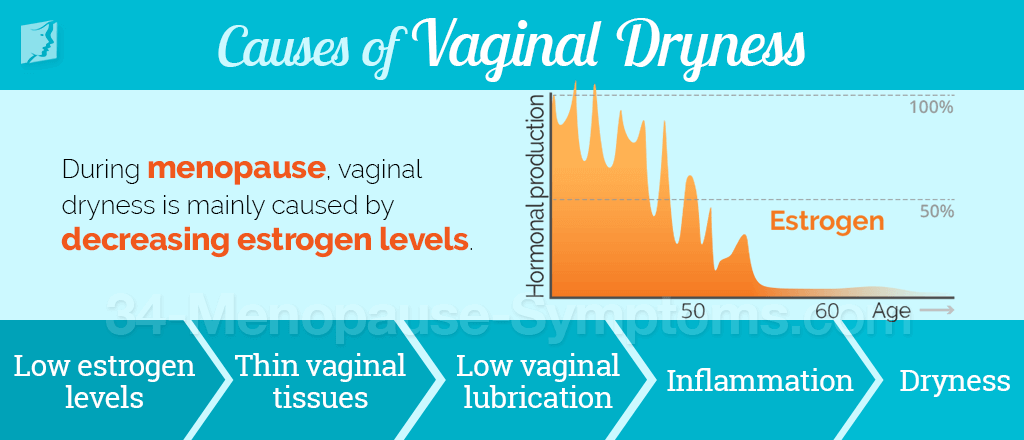Understanding the causes of vaginal dryness is crucial in order to treat it. During menopause, the most common cause of vaginal dryness is lowered levels of estrogen in the body. However, other factors can aggravate vaginal dryness. Some of these causes are hormone related, while others are connected to aspects of physiological health or the environment.
Read below to learn more about both the main hormonal causes of vaginal dryness, as well as other factors that may contribute to this symptom.
Estrogenic Causes of Vaginal Dryness
During the menopause transition, the ovaries begin to produce less estrogen in preparation for the cessation of menstruation. This decrease in estrogen is the primary cause of vaginal dryness during menopause, which typically begins in a woman's 40s or 50s.
Reduced estrogen levels often cause the vulva and vaginal tissues to become thinner and drier while losing elasticity, a condition called atrophy.
During this time, vaginal secretions and natural lubrication decrease. Drops in estrogen also affect the pH of the vagina, making the once acidic environment more alkaline, which can increase irritation and the likelihood of vaginal infection.

In addition, there are other hormonal factors that can influence vaginal dryness. Keep reading to learn more about them.
Hormonal Causes
Along with the estrogen fluctuations that occur during menopause, other factors can also provoke decreases in estrogen production, which can cause vaginal dryness.
Hormonal Causes of Vaginal Dryness

- Pregnancy and childbirth
- Breastfeeding
- Hormonal birth control
- Hormone replacement therapy (HRT)
- Cancer treatment (e.g., radiation, chemotherapy)
- Hysterectomy
- Medical and surgical menopause
Although hormonal fluctuations are one of the main causes of vaginal dryness during menopause, other factors can also cause or contribute to vaginal dryness. Read on to discover more about these other causes.
Other Causes of Vaginal Dryness
In addition to hormonal causes, other physiological, environmental, and emotional factors can cause or contribute to vaginal dryness.
Physiological Causes
- Autoimmune diseases (e.g., Sjogren's syndrome)
- Infections (bacterial, viral, or sexually transmitted)
- Certain medications:
- Antihistamines
- Cold medications
- Antidepressants
- Smoking, alcohol consumption Douching
- Allergic reaction to chemicals in soaps, detergents, etc.
Emotional Causes
Stress. Stress is a major factor that can cause or increase the severity of vaginal dryness.
Other emotional problems. Anxiety and depression can lead to lack of arousal and vaginal dryness.
Unresolved relationship issues. Relationship problems can also result in decreased vaginal lubrication during sexual activity, loss of libido, and problems with arousal.
Because there are many possible causes of vaginal dryness, a woman should consult a trusted medical professional if she is experiencing additional symptoms or if vaginal dryness is affecting her quality of life.
Fortunately, a woman can take many simple steps toward managing vaginal dryness on her own. Click on the following link to learn more about the treatments for vaginal dryness and when it might be necessary to see the doctor.
Sources
- Huang, A.J. et al. (2010). Vaginal symptoms in postmenopausal women: self-reported severity, natural history, and risk factors. Menopause, 17(1), 121-126. doi: 10.1097/gme.0b013e3181acb9ed
- Love, S. (2003). Menopause and Hormone Book. New York: Three Rivers Press.
- National Institutes of Health. (2013). Vaginal dryness. Retrieved April 6, 2016, from https://www.nlm.nih.gov/medlineplus/ency/article/000892.htm


